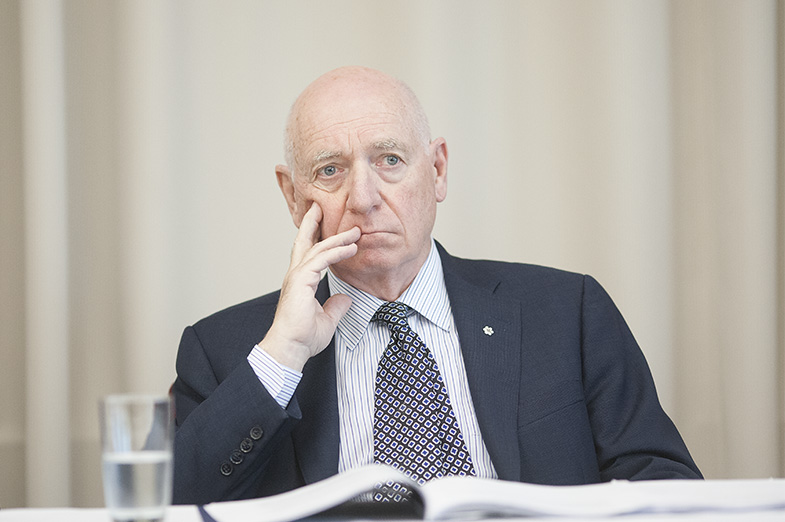
Both Algoma Public Health and the City of Sault Ste. Marie were poised to benefit financially from any profits achieved by Amit Sofer's local medical marijuana grow-op, the provincial assessment of Algoma Public Health suggests.
"According to the written statement of Dr. Barker, Mr. Sofer proposed that each of Sault Ste. Marie and Algoma Public Health would receive five percent of the profits of the venture if successul," assessor Graham Scott (shown) said in his report, released last week at the Sault Ste. Marie Civic Centre.
The entanglement of a public health unit in a private drug venture was deeply concerning to Scott.
How did it happen?
Sofer appeared at a closed-door meeting of the board of health on February 19 to promote his Algoma Medicinal Alliance, which proposed growing medicinal marijuana in the vacant PUC building on Second Line East.
In his report, Scott criticized the short notice given to the health board that day as a motion was presented to appoint APH board Chair Marchy Bruni to the board of the private venture.
"No documentation had been provided in advance so the directors were confronted with the proposal and related issues without advance warning," Scott said.
Sofer sold APH on appointing Bruni to his board by suggesting that Bruni would look after APH's interests there, Scott said.
He added that Sault Ste. Marie Chief Administrative Officer Joe Fratesi would also be on the grow-op's board.
The Algoma Medicinal Alliance had actually been incorporated 12 days earlier, with both Bruni and Medical Officer of Health Kim Barker listed as founding directors.
"A number of directors felt they were being put in a difficult position and were reluctant to be negative, particularly as there were so many prominent people in the community supporting it, including the chief of police and [APH's] lawyer, who was also the lawyer for Algoma Medical Alliance," Scott said.
Sofer dropped the project after details of Rootenberg's criminal past became public in January.
"It is important to note that there is no evidence that any of the subjects of this assessment including the chair, the board, the medical officer of health or the interim chief financial officer received any financial advantage as a result of their involvement in this project," Scott concluded.
"Had the project been successful it is possible the circumstances might have changed," he added.
The provincial assessor said that a licensed marijuana facility might have been worthy of municipal support as a creator of 100 jobs and economic growth, but he found the involvement of APH to be "difficult to explain and to justify."
"The logic that applies to Sault Ste. Marie support does not apply to a municipal/ provincial public agency which has a very different public mandate focussed on community health for a very large region beyond Sault Ste. Marie," Scott said.
"It has no mandate to utlilize its time and resources for economic development or to endorse or appear to endorse a for-profit local development project."
"In any event, any action by [APH] to step beyond or extend that mandate requires a lot more attention than was provided by the board. This applies even more directly to its chair, the medical officer of health and the interim chief financial officer, who had far more extensive knowledge of the situation than the rest of the board."
Board chair Marchy Bruni, Medical Officer of Health Kim Barker and Interm Chief Financial Officer Shaun Rootenberg have all resigned since Rootenberg's criminal history became public knowledge.
Scott concluded that the involvement of the health unit in a private medical marijuana venture deserved far more discussion than it got from the APH board.
"Should a publicly funded public health unit be seen to be supporting a private-sector for-profit drug application?" he asked.
"If Algoma Medicinal Alliance is appropriate for a relationship with a public health unit, why not a multinational drug supplier?"
Scott was also concerned about the potential for conflicts of interest, particularly if Algoma Medicinal Alliance turned out to be successful.
"Clearing the air may have been all that was required," he wrote, "but the failure to note the conflicts, real or potential, and to adequately discuss them, falls well short of the board's fiduciary responsibilty."
(PHOTO: Provincial assessor Graham Scott at Sault Ste. Marie's Civic Centre on Tuesday, June 16, 2015. Kenneth Armstrong/SooToday)